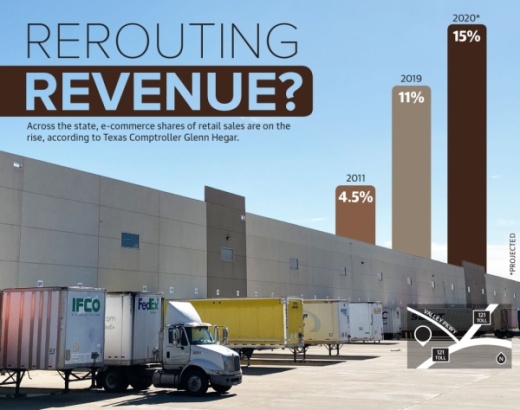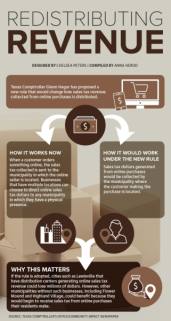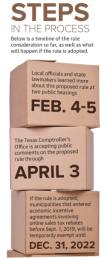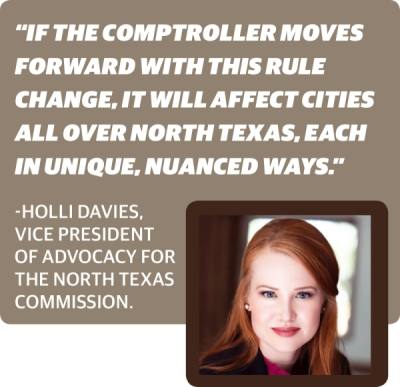Currently, if a Texas resident makes an online purchase, the sales tax dollars from that purchase do not necessarily go to the city that resident lives in. Instead, that revenue goes to the city where the business is located.
However, if Texas Comptroller Glenn Hegar adopts a rule he has proposed, sales tax revenue collected on internet purchases would be redirected to the city in which a customer buys an item.
This would mean, for example, that if a Lewisville resident bought a computer from Dell online, the city of Lewisville would receive the sales tax revenue from that purchase instead of Round Rock, where Dell Technologies is headquartered.
Hegar said the proposed rule is meant to distribute sales tax from online purchases more equitably across the state.
However, many cities, including Lewisville, do not support the proposed change.
“The cities that are concerned about the potential impact of this rule, however, have pointed out •that this would be a sweeping change coming from a state agency and not from the Texas Legislature,” said James Kunke, Lewisville community relations and tourism director.
Kunke said the vast majority of the $1.3 million at stake for Lewisville is sales tax revenue from purchases at Bed Bath & Beyond, which has a distribution center on South Valley Parkway near TX-121.
Some cities could lose millions more. According to Round Rock officials, their city could potentially lose $20 million in annual sales tax revenue generated by the headquarters of Dell Technologies if the rule is adopted.
However, not all municipalities would be negatively affected by the proposed change. In fact, Flower Mound and Highland Village officials said their communities could benefit financially.
“Highland Village does not have any warehouses, so we would not see a loss of revenue,” Highland Village City Manager Michael Leavitt said. “Our community, like many around the country, does like to shop online, so the proposed change could benefit us.”
Questions about where sales tax dollars should go have come up more and more as internet sales have rapidly increased with the advancement of technology, Hegar said at a Feb. 6 hearing.
“We believe that the amendments will provide clarity to the businesses and the local jurisdictions and also will help to prevent any arbitrary shifting of local revenues from one jurisdiction to another,” Hegar said.
Holli Davies is the vice president of advocacy for the North Texas Commission, a public-private group that works with 13 North Texas counties on regional issues. She said that representatives of some cities in the region believe that the comptroller does not have the authority to implement such a sweeping change.
“If the comptroller moves forward with this rule change, it will affect cities all over North Texas, each in unique, nuanced ways,” Davies said.
She added that the North Texas Commission has not yet taken a position on the proposed rule.
“The other critique some cities have about this is that they believe the comptroller’s office is moving forward too fast because they have not completed an impact analysis,” Davies said. “So some cities feel they don’t have the data they need to fully understand how their budgets would be impacted. They only have rough estimates.”
So far, Davies said, there has been a healthy discussion among stakeholders about the proposed rule.
Economic development
Some officials believe the proposed rule will make their cities less competitive in the economic development arena.
As the system currently stands, Texas businesses are legally allowed to direct internet sales tax dollars to any city in which they have a physical presence. This means that a corporation can choose to send all of its sales tax from internet purchases to a single city in which it has a facility. Cities with warehouses or distribution centers are typically the ones chosen.
Businesses often choose cities because of the city’s efforts to reward businesses that locate within their borders. For example, in exchange for Bed Bath & Beyond choosing Lewisville for its distribution center, the city agreed to give the business a partial refund in online sales tax dollars that would have otherwise gone to the city.
“Sometimes, a business comes to town, and they don’t generate enough property tax investment to make a property tax abatement worthwhile, but they generate a whole lot of sales tax,” Kunke said. “So rebating some of that to them can be used as an incentive to have them pick your city as opposed to another location.”
The city still keeps a portion of the sales tax revenue, he said.
“The money we rebate them is money we wouldn’t have anyway if they hadn’t moved here,” Kunke said.
Though losing $1.3 million in sales tax revenue would be unfortunate, Kunke said, the city’s main concern is what the rule could mean for economic development. If the rule is adopted, cities will no longer be able to offer internet sales tax rebates as economic incentives.
“I’ll tell you right now. There’s a lot of competition for businesses between Texas cities and Tennessee cities, Georgia cities, Florida cities and Arizona cities,” Kunke said. “This rule would take an economic development tool out of our toolbox that those other states will still have. We just think this rule would have so many potential negative impacts and potential unintended consequences.”
What the future holds
The comptroller’s office has extended the public input period on its proposed rule change through April 3.
“There’s a lot of questions out there that cities are asking, and it sounds like the comptroller is wanting to accommodate those questions,” Davies said.
If the rule is implemented, businesses and cities who have entered into economic incentive agreements before Sept. 1, 2019, that involve internet sales tax rebates would be exempt from the rule until Dec. 31, 2022.
“We understand every city is different, and while this proposal may be a positive for us, it could be a negative for our neighboring cities,” Leavitt said.








